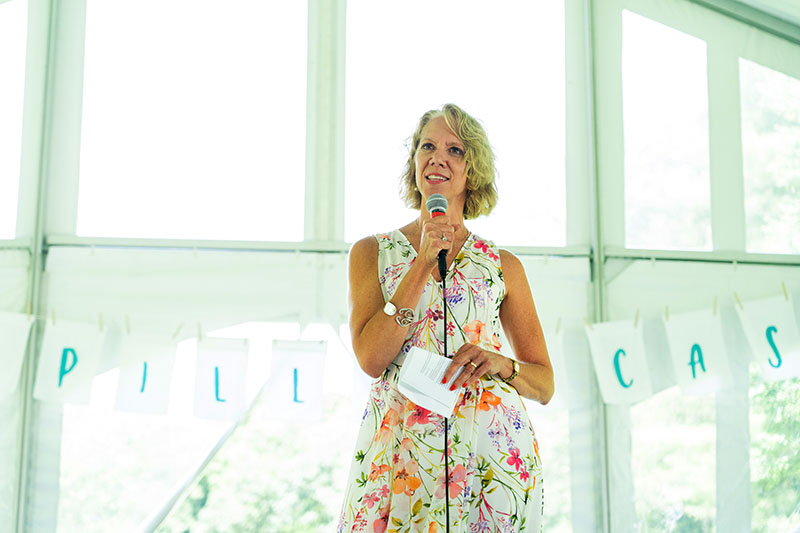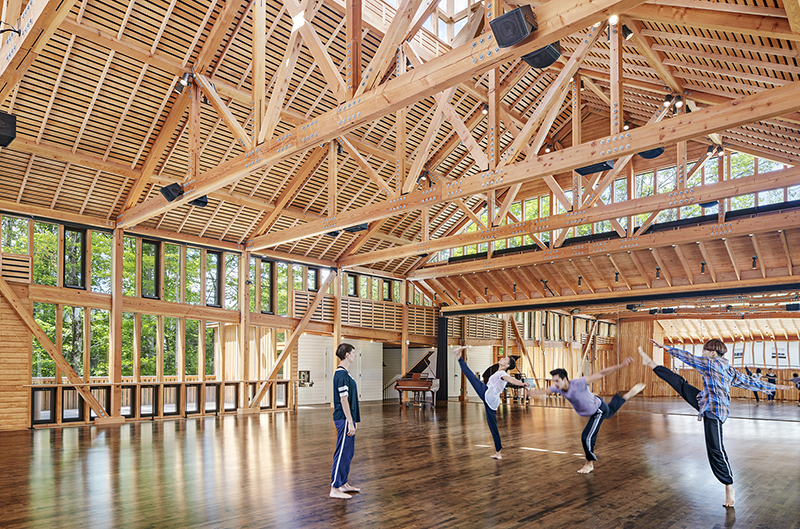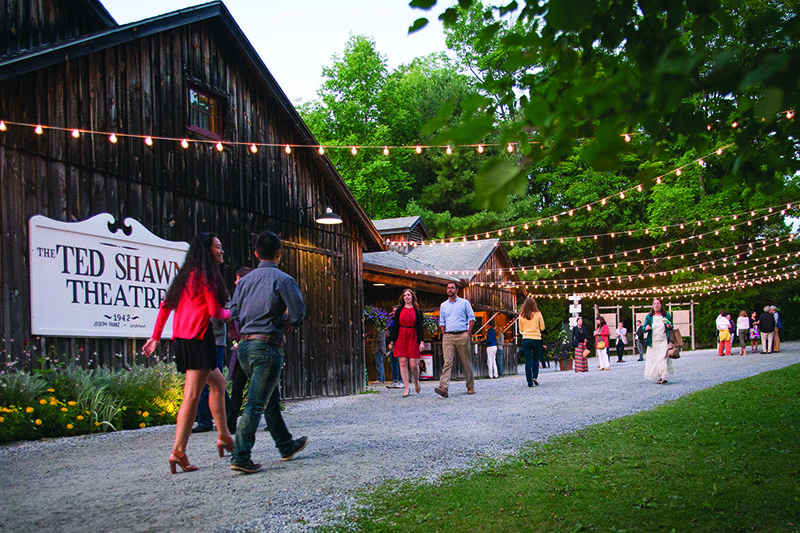A Changed Landscape
An Interview with Pamela Tatge at Jacob’s Pillow
BY EMMALY WIEDERHOLT
Pamela Tatge is the Executive and Artistic Director of Jacob’s Pillow, an international dance festival, school, and archives located in the Berkshires in Western Massachusetts. Here, she describes how Jacob’s Pillow pivoted to a virtual festival this past summer, how the staff used the pandemic as a time of self-reflection, and ways the organization is working to better inclusion at the leadership level.
This interview is part of a series looking at how dance organizations have responded to the tumultuous events of 2020.

Pamela Tatge, Photo Hayim Heron
~~
What was Jacob’s Pillow’s initial response to the pandemic back in March and April?
The thing about Jacob’s Pillow is that we are an 88-year-old festival that is a tightly coiled machine. When the pandemic started, we realized our international artists were having issues with travel funding and their visas were in question, so the board and staff came together and made the very difficult decision on March 30th to cancel the festival for the first time in its history.
Soon after that, we laid off 35 percent of our staff. Existing staff took pay cuts. In losing the festival, we lost 50 percent of our income. We took a budget that was almost 8 million and took it down to 3.7 million. It was one of those moments that’s a shock to the system.
We had a bit of time to reflect and made the decision that we were going to pivot to a virtual festival. We created an online gala that premiered on June 20th, and then our festival began the first week in July and ran for eight weeks. We did 38 events in eight weeks, and only 20 percent was pre-existing content, so the rest all had to be produced. We essentially became producers of television. We had to learn new skills, but there was a great sense that we had to deliver on our mission and get funding to artists. We’re a summer festival, so we had to be there for artists in the summer.
How did Jacob’s Pillow shift (or did it shift) in response to the George Floyd protests this past summer?
We have been working on what we call IDEA – inclusion, diversity, equity, and access – for the past four years. When the George Floyd murder and its aftermath happened, it accelerated our work. Right away, I decided to think about gatekeeping at Jacob’s Pillow. I researched and found two associate curators who are women of color and who would work with me on the programming for the Pillow Lab in the fall and spring, as well as festival 2021. Those curators came on in August.
We made a statement of commitment on June 5th, just like everybody else, but our commitments were actions, not just words. Each action needed a plan. We started with a great deal of self-reflection by the staff. We held bi-weekly meetings. It became the center of what we did to make plans in order to realize these actions.
IDEA had been a small staff taskforce, but we made the decision that it was the job of the entire staff. There’s now a steering committee led by me and the deputy director that is moving the work forward. Senior leadership basically took hold of this initiative in an organization-wide way. Our board met to receive the plans that the staff put together, and they have established a new subcommittee to draft how they are going to move forward on realizing our action statements.
Now that we’re several months into this pandemic and headed into a long winter, how is Jacob’s Pillow currently responding to the needs of the dance community?
We have embraced the fact that we have a remote location. We are a safe place to be in the time of COVID. We have always been a refuge for artists. So we worked with a medical director in New York City, Dr. Wendy Ziecheck, to help us create a protocol whereby we have invited four companies to be with us this fall. There will be another seven or eight in the spring. Artists have to be able to dance together without masks. We’re creating a bubble so artists can do that.

Perles Family Studio, Photo Robert Benson
We are also thinking differently about compensating artists. We were very influenced by the Creating New Futures paper, so we’re now compensating artists for their planning time to prepare for the residency.
Typically, we’d have a showing or work-in-progress at the end of a Pillow Lab, but we can’t do that now, so we’re producing something called Inside the Pillow Lab, which is an 8-12 minute film about each artist. It will create a permanent record of what artists are thinking about and doing at this time, but also, we are hopefully using the global platform that is Jacob’s Pillow to bring these artists to the attention of the world.
Looking toward the future, how far out does Jacob’s Pillow feel able to plan?
We are planning and working towards an in-person festival in summer 2021. It will lean into our presence as an outdoor festival. There will be social distancing and reduced capacity. We will anchor ourselves in the earth, as well as in the ether. We will have a multi-platform festival that will manifest both in-person and in the digital realm.
In terms of our success this past summer attracting new audiences to Jacob’s Pillow – 80 percent of the people who attended were new to us – there’s such potential to fulfill our mission around the country and world through a digital platform. That’s been a silver lining of this time for sure.
How do you think 2020 is going to impact Jacob’s Pillow in the long term?
To have been pretty much one way for 88 years and to have this pause has enabled us to think about a lot of things in systemic ways: What are the processes by which we run our school? Who is archived? How are they archived? We are asking big questions in this time that, when we come back together, will forever change us. We will be changed because we reflected. We are bringing in an outside group of external reviewers, of Black and Brown artists and cultural practitioners, to take a look at our processes and give us feedback. We can do that in this timeframe, and that will influence 2022 and beyond.
Jacob’s Pillow has always had a robust digital platform; we’re one of the few dance organizations in the world that had so much content available online 24/7. We are maximizing the potential of that platform right now by expanding it. It will have a higher profile in future years. We already had a digital presence, and my goodness, we’re so grateful we had so much content to draw upon for our festival last summer and moving forward.
I also have to mention that our school went completely online last summer. In one program, we had participants from eight different time zones. We succeeded in bringing people around the world together with incredibly provocative and inspiring faculty. The educational reach and who gets to be in a room together because of digital platforms is really exciting.
How do you think 2020 is going to impact the dance field in general in the long term?
It’s been devastating. The residencies we are providing are to a handful of companies, but there are so many companies that have not been able to be in a rehearsal room together and touch each other. It’s going to take a long time for companies to come back. We’ve already lost some dance spaces, and we may lose some companies that simply can’t financially make it through. Because of the PPP, the companies I speak with are okay for 2020, but 2021 is the big unknown.
It’s important to realize that, in terms of technology, not every artist has access to convert themselves to the digital realm. Not every artist has an interest in it.
We will have a changed landscape. We will also have a landscape that needs our work to heal and rebuild. To the extent to which we as leaders can insert ourselves into regional community discussions about recovery, we have a responsibility to be citizens of the places where we operate. That’s an important role all of us need to play.

Outside Ted Shawn Theatre, Photo David Dashiell
~~
To learn more, visit www.jacobspillow.org.
This interview was conducted shortly before Jacob’s Pillow’s Doris Duke Theatre burned to the ground on November 17th. If you would like to learn more, share a memory, or donate, visit www.jacobspillow.org/info-on-the-doris-duke-theatre-fire.
